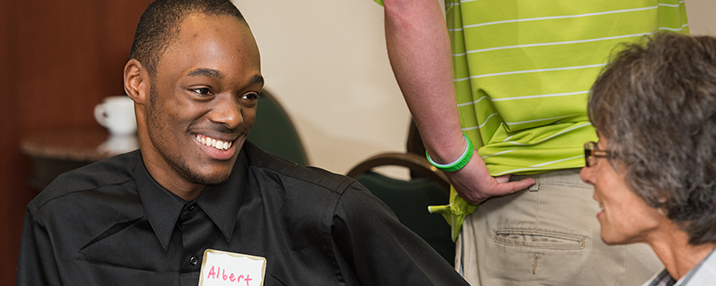CDS administers Disability Studies, UD’s largest minor, and the Spectrum Scholars, Access:Ability Scholars and Career and Life Services Certificate (CLSC) programs. It also created a Leadership Education in Neurodevelopmental and Related Disabilities (LEND) program that trains graduate students and postdoctoral residents in person-centered care, and it implements the Special Education Administrative Leadership (SEAL) program, which prepares Delaware educators for special education leadership roles.
The Disability Studies Minor
Disability Studies consistently ranks as the University of Delaware’s most popular minor. Drawing students from disciplines spanning cognitive science, elementary education and even history, management and art, the minor allows them, in the words of one student, “to connect with peers from different majors who share a passion.”
For some students, that passion is about better appreciating and supporting the 20 percent of people who have a disability. For others, it’s about enhancing their abilities to create a more inclusive society. For still others, it’s about increasing their knowledge and skills so they can boost their marketability for advanced degrees and careers in related fields. Learn how the minor can facilitate all those things here.
Career & Life Studies Certificate (CLSC) program
Most adults with intellectual disabilities are told they will never go to college. Yet in many ways, college offers the exact type of opportunities that support the goals of people with intellectual disabilities: furthering education, establishing career goals, connecting with peers and learning how to use natural supports and live interdependently.
Students in CLSC attend UD for two or four years. They take undergraduate courses, join clubs, hold internships and can also live in the UD residence halls. The Career & Life Studies Certificate (CLSC) program is the only college program in Delaware designed specifically for people with intellectual disabilities. CLSC is part of a growing national movement which recognizes that students with intellectual disabilities should have the option to attend college.
Spectrum Scholars
Students with autism have incredible talent that too often goes unrecognized. Many autistic students have the ability to succeed in higher education, which can boost their career opportunities. Yet the adjustment to college life can be difficult, given rules for relating with peers and faculty, higher-level academic requirements, and expectations for individual decision-making and self-advocacy.
In collaboration with JPMorgan Chase & Co., UD has developed Spectrum Scholars, a program overseen by CDS that offers a system of supports and career development opportunities for select undergraduate students with autism. Spectrum Scholars receive coaching on how to develop study skills, campus connections and self-determination they will need to succeed in college and in their careers. UD faculty and staff, as well as community members, also receive training and consultation as we develop a campus community that increasingly appreciates neurodiversity.
Access:Ability Scholars
Launched in Fall 2018, the Access:Ability Scholars program engages talented, creative, and intellectually curious freshmen and transfer students in “building a world for every body.” Scholars are selected from among a diverse pool of newly admitted undergraduates who are committed to developing, exploring, designing, and advocating for inclusive, strengths-based approaches and responses to disability.
Through coursework, research, service learning, and individualized learning experiences Access:Ability Scholars integrate their academic learning and real- world experiences. Formal and informal events designed especially for the scholars support them in building connections with a diverse group of academics and people in the community who care about disability. Across their four years at UD, Access:Ability Scholars focus on ways they can contribute to their academic career field and the disability community at large. Learn more about Access:Ability Scholars here.
Access:Ability Scholars Opportunities (password protected): This database includes a list of potential positions with University and partner organizations.
Submit Opportunity: Use this form to submit an opportunity. Your submission will be reviewed and you will be contacted with any questions.
Delaware’s Special Education Administrative Leadership (SEAL) Program
The shortage of appropriately trained special education leaders is problematic nationwide, but even more acute in Delaware. Although a special education director credential exists in Delaware code, fewer than half of current directors are credentialed.
To prepare more special education leaders to take on their ever-evolving roles and responsibilities, the Center for Disabilities Studies, in partnership with other education centers at the University of Delaware and the Delaware Department of Education (DDOE), launched in January 2020 the state’s first special education-specific leadership training program. It offers an alternate route to certification for special education administrators and is supported by a five-year, $1 million grant from the U.S. Department of Education.
Leadership Education in Neurodevelopmental Disabilities (LEND)
Delaware’s growing capacity for serving people with ASD and their families requires a new generation of leaders to sustain and guarantee its future success.
The Delaware Leadership Education in Neurodevelopmental Disabilities (LEND) training program is part of a national network of training programs for pre-professionals, professionals, self-advocates and family members that promotes interdisciplinary, culturally competent, family-centered care. A year-long intensive training program offers experiential learning opportunities for graduate students, postdoctoral fellows, family members and self-advocates, who work together to understand the most pressing challenges and develop innovative solutions. Trainees work with experts at the University of Delaware and Nemours/A.I. duPont Hospital for Children, and with self-advocates and families in their homes and natural environments, as they are tasked with considering how they will contribute as future leaders in their field.

